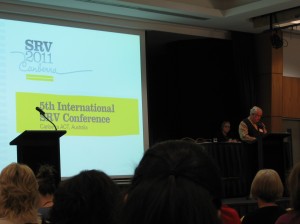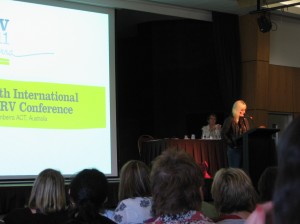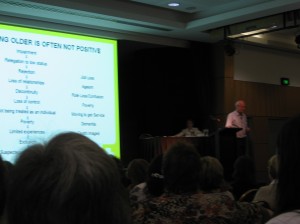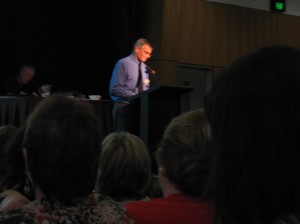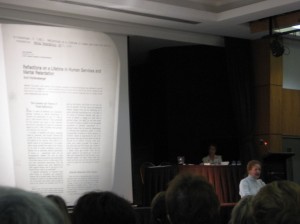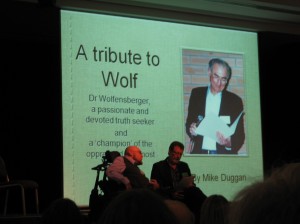George Durner: l’Arche and relationship
George is responsible for training and formation at l’Arche. His talk reminded me of the Wolfensberger teaching and article on the gifts of mentally retarded people. George shared stories of personal encounters early in his adult life in which he received the gift of a “simple but profound lesson, the realization of how much we need each other as human beings.”
He told several stories which illustrated the surprising power that can flow from interpersonal identification, of stepping into the shoes of another person, to see them as like ourselves in the essential ways and to want the ‘good things of life’ for them.
Particularly with societally devalued people who are living in heightened vulnerability, George spoke about how genuine relationships require the decision of not seeing or treating the other in the devalued role of object; and giving up the power over, and control of, which the role of object brings. We might fruitfully reflect on what gets in the way of us crafting such genuine relationships with societally devalued people, especially in relationships of service; and what can help foster and enrich such relationships.
Tweet
Debbie Kilroy: women and prison
Debbie shared stories of her own life, as someone who was jailed both as a young person and later as an adult. She compellingly described her own early life as one of cascading vulnerability: being locked up as a teen, abused, surrounded by low negative stereotypical expectations, socialized into prisoner role … all the while leading to her being put under control of the human service system. Debbie eventually became a lawyer, and started an organization called Sisters Inside, providing various direct and advocacy supports to women prisoners.
Tweet
In: Uncategorized · Tagged with: prison, SRV, SRV conference
Mike Rungie: valued roles for elders
Mike directs an organization that provides supports to elders, including elders with medical conditions and/or dementia. He spoke about some of the lessons his organization has learned through using an assessment tool (SIP) derived from and influenced by the PASSING tool (Wolfensberger and Thomas, 2007).
Some questions raised by Mike’s presentation include: what are valued and devalued roles specifically for elders in contemporary western culture? And for different age groups (e.g., 60s, 70s, 80s, 90s and so on)? How can we identify and heighten the positive aspects of valued roles which an elder currently has?
One of the lessons Mike pointed out was the benefit of elders thinking ahead, and often being helped to think ahead, about where they want to be over the next 10 years, to act and plan now; in SRV concepts, to think about what roles one wants, and what steps of competency enhancement one should engage in now as a way of acquiring or holding onto those roles in the future.
Tweet
In: Uncategorized · Tagged with: elders, SRV, SRV conference, valued roles
Guy Caruso: looking at ‘best practice’ from an SRV perspective
Guy Caruso gave a plenary presentation this morning (based on a paper written by Guy and Joe Osburn, and edited by the late Wolf Wolfensberger) in which he analyzed the concept and practice of ‘best practice’ in human services, and its roots in and connection to Social Role Valorization. This link is often ignored, denied or unknown, which can lead to several problems, such as the danger of losing one’s bearings when a good practice is disconnected from ideology, its context and sources, related practices, etc. We see this in so many of the common fads and perversions prevalent in human services today.
Guy also made the point that a so-called best practice may be labelled as such ‘without confirmation or demonstration,’ and thus emphasized the essential link between SRV and PASSING, i.e., the necessity of a rigorous practice of, and a critical tool for, assessment.
Guy is a long-term student and later associate of Wolfensberger; and a member of the North American SRV Development, Training and Safeguarding Council.
Tweet
In: Uncategorized · Tagged with: Social Role Valorization, SRV, Wolf Wolfensberger
Tribute to the work of Wolf Wolfensberger
Susan Thomas and Mike Duggan gave brief presentations on the history of Wolf Wolfensberger’s work.
Susan worked for and with Wolf for 38 years. She is a primary trainer of SRV and PASSING, plus all of the other Training Institute workshops (such as the multi-day workshops on ‘striving for moral coherency in a disfunctional world’ and on the ‘threats to the lives of societally devalued people’). Susan plays an instrumental role in the ongoing training and development of new leaders in SRV and PASSING. She co-authored with Wolfensberger many articles as well as the text PASSING, and is the author of multiple articles on SRV and related work. She is on the editorial board of The SRV Journal, and is a member of the North American SRV Development, Training and Safeguarding Council. One of her primary points in this morning’s tribute was that Wolf’s work was a battle for ideas, minds and hearts. Ideas are powerful; ideas have consequences.
Mike gave a tribute to Wolfensberger as ‘a passionate and devoted truth seeker and a champion of the oppressed and most vulnerable.’ In this presentation, he listed 9 of Wolf’s (many) contributions. One that stood out for me was Mike’s emphasis on the devastation of heightened vulnerability, and the power of valued social roles to address vulnerability and devaluation. He powerfully shared how Wolf’s teaching and insights gave a framework and language to the devaluation he himself was experiencing. Indeed, he said that Wolf’s work made him feel safe.
Mike was a presenter at the very first International SRV Conference, and is published in The SRV Journal. Though growing up with his family, he later had the devalued roles of patient and institution resident as a young person. Mike went on to get the valued role of university graduate and today has the valued roles of neighbor, tenant, jazz lover, sports enthusiast, activist, parishioner, eucharistic minister; as well as the good things of life which come from those and other valued roles.
Tweet
In: Uncategorized · Tagged with: SRV, SRV conference, Wolf Wolfensberger
Guest post: Disability and transhumanism
The following is a guest blog post submitted by Steven Tiffany:
Last week I stumbled across a blog posting reviewing a new documentary that takes an in depth look at the relationship between disability and impairment and the relatively new movement known as “transhumanism.” What exactly is transhumanism? Well, in a nutshell, it is the utopian idea that at some point in the near future, humans will go beyond simply being human, and due to advances in technology, genetics and other areas of science, will find themselves living in a world where humans and machines have become inseparable and indeed are one and the same. While proponents of this theory believe that the event in which this union should occur (referred to as “the singularity”) is one to be anticipated and celebrated, detractors (especially those in the disability community) have urged people to approach the idea with restraint, and to at least consider the societal implications of such an event.
The approach of the filmmakers in the documentary mentioned above seems to be an analysis of the issue from several sides, while allowing the viewer to make the final judgement on whether transhumanism is truly desirable for our society.
What is the relevance of transhumanism to Social Role Valorization? While there are several connections that can be made, here is one that I was able to tease out:
Transhumanism assumes that the human experience is deficient, especially for people with disabilities. It is through interaction with machines that disabled people will be able to use their bodies and minds to the fullest potential. The most recent relevant example of this is that of South African sprinter Oscar Pistorius, referred to in the media as the Blade Runner. Pistorius, despite missing the bottom half of both of his legs, has had a successful career as a sprinter in regular sporting events due to the implantation of ‘blades’ in place of where his lower legs would be.
This issue presents a conflict for practitioners of SRV theory. While it has been very role valorizing for people like Pistorius to take advantage of modern technologies to “improve” their bodies, what will be the impact of such measures on disabled people as an overall class? Will such measures serve to further devalue those who do not have the latest implants and technologies at their disposal? One can envision a future in which disabled people are further subdivided into those who can afford to improve their bodies and those who cannot.
TweetIn: Uncategorized · Tagged with: competency enhancement, heightened vulnerability, Social Role Valorization, SRV
Follow-up reflections after attending a PASSING workshop
SRV and PASSING training has been done in many agencies in many different countries over the last almost 30 years. Attending SRV and PASSING workshops are certainly intense learning experiences. By itself, however, attendance at these workshops is not likely to make a long-term positive difference for an agency service worker, nor more importantly for the people served. Internalization of learning, taking on leadership roles, and developing the necessary skills and habits to craft valued social roles for societally devalued people requires more: a supportive program or agency environment, co-workers with similar SRV-based understanding and skills, sufficient time to build and carry out relevant and potent SRV steps, and so on.
How might these factors be nurtured over time? One useful principle is to remember that attendance at SRV and PASSING workshops are the beginning of learning a new way of carrying out one’s service role, not the end. Too often, services act as if attendance at a workshop or two is all that is needed. Not so. How can learning be internalized? How can it be turned into concrete and habitual action? What will sustain continued learning and concrete action in the face of competing mindsets, responsibilities, pressures, and so on?
More learning of course is not all that is needed but it is helpful. One useful learning strategy (certainly not the only one) might be for workshop attendees to have opportunities to reflect on and to discuss what they learned at SRV and PASSING, particularly in the concrete context of their day-to-day roles. Program supervisors and training staff can help with such reflection and discussion in myriad ways. One such way for example would be to facilitate follow-up reflective discussions with attendees, making sure that such reflection is rooted in service workers’ actual day-by-day, week-by-week, month-by-month responsibilities.
Questions regarding the learning of SRV and the PASSING tool:
• After attending SRV and PASSING workshops, in what ways are you better able to identify with devalued people in general and with the people you serve in particular?
• What strategies in support of interpersonal identification did you learn from attending SRV and PASSING?
• How will you know if you are better able to identify with vulnerable people; what guideposts or signs will you look for?
• What gets in the way of your identification with devalued people in general or specifically? How might you and your fellow staff overcome such barriers? What help would you need to do so?
TweetIn: Uncategorized · Tagged with: interpersonal identification, PASSING
Human service system in New York (US)
The New York Times has been running a series of articles on the state human service system for impaired people. See also this related article. Much of the material is quite painful to read, watch and listen to. The related articles and videos are worth reviewing and reflecting on from an Social Role Valorization perspective. The articles and videos deal with both programmatic and non-programmatic issues. Observe the language that is used, the roles which servers and service recipients are in, the layers of unconsciousness and social and societal devaluation, etc.
TweetIn: Uncategorized · Tagged with: abuse, Social Role Valorization
SRV group in the UK
Over the past several years, a Social Role Valorization group called VERA (Values Education and Research Association) has been operating in the UK. David Race, long-term teacher of SRV and author, is one of its members. The website describes VERA as set up to support the study, teaching and dissemination of SRV. The site includes news, a training calendar, documents to download and information on upcoming workshops. Take a look!
TweetIn: Uncategorized · Tagged with: Social Role Valorization, SRV, SRV training
Leisure roles
This 2009 article entitled “Serious leisure and people with intellectual disabilities: Benefits and opportunities” in the journal Leisure Studies describes efforts to help impaired people participate in ‘serious’ leisure activities, meaning leisure activities that a person engages in fully and has done so successfully for a long time. The authors mention Nirje and Wolfensberger, Normalization and Social Role Valorization in the text and bibliography.
The article begins with some background material about devaluation, wounding, discontinuity of relationship and devalued roles (not necessarily using that language) to set the stage for describing a study carried out in Brisbane, Australia. The study involved interviewing adults with intellectual impairments who were supported by agencies that had a focus on leisure involvement.
The authors state that they are in part writing in response to wide scale unemployment of adults with impairments, with a premise that engaging in serious leisure can be a way of developing skills and forming relationships even in the absence of work. It might be interesting for one of our readers to compare this article with Wolfensberger and Thomas’s 2009 article in the SRV Journal concerning unpaid work for impaired people (‘Some thoughts on the role valorizing merits of valued paid and unpaid activities, The SRV Journal, 4(2), 12-18).
It is an interesting article and seems to fit within the context of SRV, in that having valued roles (including leisure roles, which is one of the role categories mentioned on p. 30 of the 2004 reprint of “Introduction to Social Role Valorization by Wolfensberger) can open the door to the good things of life. I would like to have read more about the details and the reported ‘outcomes’ for people in the study: how long they had engaged in these serious leisure activities, how much they were actually participating, who else engaged in these activities, when this occurred, the relationships that had developed and with whom, whether their participation in these leisure activities was seen as positive by all involved, etc., etc. Some of these relate to issues we teach, in longer SRV workshops, around personal social integration and valued social and societal participation, and around social roles. I also wonder whether the agencies supporting the people interviewed gave serious thought to social roles, rather than just to activities, and if they took image enhancement of the people served into account.
The authors touch on issues of competency development as a fruit of engaging in serious leisure.
There is some usage of ‘quality of life’ language in the article. If you want to think more about that language use issue, Dr. Wolfensberger wrote a strong critique of such language use in a lengthy chapter entitled ‘Let’s hang up ‘quality of life’ as a hopeless term,’ published in D. Goode (Ed.). Quality of life for persons with disabilities: International perspectives and issues (pp. 285-321). Cambridge, MA: Brookline Books.
TweetIn: Uncategorized · Tagged with: good things of life, image enhancement, leisure, social roles

